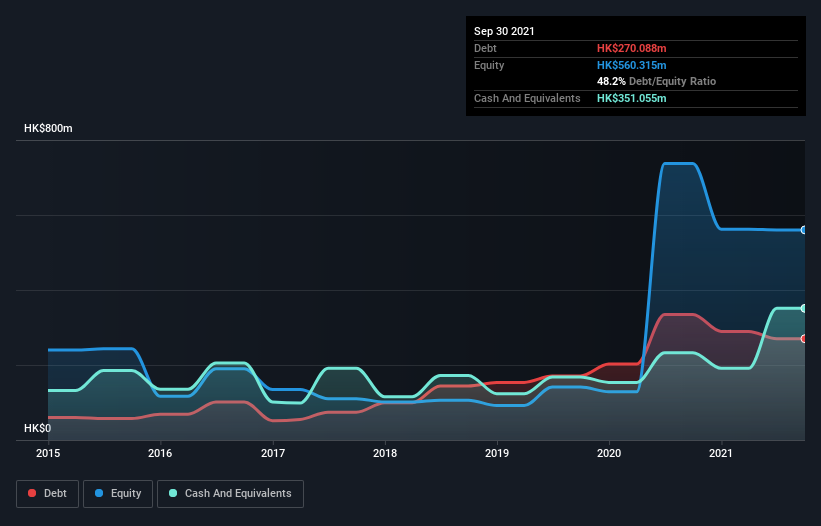- Hong Kong
- /
- Real Estate
- /
- SEHK:674
China Tangshang Holdings (HKG:674) Takes On Some Risk With Its Use Of Debt
The external fund manager backed by Berkshire Hathaway's Charlie Munger, Li Lu, makes no bones about it when he says 'The biggest investment risk is not the volatility of prices, but whether you will suffer a permanent loss of capital.' So it seems the smart money knows that debt - which is usually involved in bankruptcies - is a very important factor, when you assess how risky a company is. We note that China Tangshang Holdings Limited (HKG:674) does have debt on its balance sheet. But should shareholders be worried about its use of debt?
When Is Debt A Problem?
Debt assists a business until the business has trouble paying it off, either with new capital or with free cash flow. If things get really bad, the lenders can take control of the business. However, a more common (but still painful) scenario is that it has to raise new equity capital at a low price, thus permanently diluting shareholders. By replacing dilution, though, debt can be an extremely good tool for businesses that need capital to invest in growth at high rates of return. The first thing to do when considering how much debt a business uses is to look at its cash and debt together.
View our latest analysis for China Tangshang Holdings
What Is China Tangshang Holdings's Net Debt?
As you can see below, China Tangshang Holdings had HK$270.1m of debt at September 2021, down from HK$334.7m a year prior. However, its balance sheet shows it holds HK$351.1m in cash, so it actually has HK$81.0m net cash.

How Strong Is China Tangshang Holdings' Balance Sheet?
We can see from the most recent balance sheet that China Tangshang Holdings had liabilities of HK$1.08b falling due within a year, and liabilities of HK$509.7m due beyond that. On the other hand, it had cash of HK$351.1m and HK$37.5m worth of receivables due within a year. So its liabilities total HK$1.21b more than the combination of its cash and short-term receivables.
The deficiency here weighs heavily on the HK$385.6m company itself, as if a child were struggling under the weight of an enormous back-pack full of books, his sports gear, and a trumpet. So we'd watch its balance sheet closely, without a doubt. At the end of the day, China Tangshang Holdings would probably need a major re-capitalization if its creditors were to demand repayment. Given that China Tangshang Holdings has more cash than debt, we're pretty confident it can handle its debt, despite the fact that it has a lot of liabilities in total.
The bad news is that China Tangshang Holdings saw its EBIT decline by 18% over the last year. If earnings continue to decline at that rate then handling the debt will be more difficult than taking three children under 5 to a fancy pants restaurant. There's no doubt that we learn most about debt from the balance sheet. But it is China Tangshang Holdings's earnings that will influence how the balance sheet holds up in the future. So if you're keen to discover more about its earnings, it might be worth checking out this graph of its long term earnings trend.
Finally, a business needs free cash flow to pay off debt; accounting profits just don't cut it. While China Tangshang Holdings has net cash on its balance sheet, it's still worth taking a look at its ability to convert earnings before interest and tax (EBIT) to free cash flow, to help us understand how quickly it is building (or eroding) that cash balance. Over the last two years, China Tangshang Holdings actually produced more free cash flow than EBIT. That sort of strong cash conversion gets us as excited as the crowd when the beat drops at a Daft Punk concert.
Summing up
While China Tangshang Holdings does have more liabilities than liquid assets, it also has net cash of HK$81.0m. And it impressed us with free cash flow of HK$103m, being 526% of its EBIT. Despite the cash, we do find China Tangshang Holdings's level of total liabilities concerning, so we're not particularly comfortable with the stock. When analysing debt levels, the balance sheet is the obvious place to start. But ultimately, every company can contain risks that exist outside of the balance sheet. For instance, we've identified 2 warning signs for China Tangshang Holdings that you should be aware of.
Of course, if you're the type of investor who prefers buying stocks without the burden of debt, then don't hesitate to discover our exclusive list of net cash growth stocks, today.
New: AI Stock Screener & Alerts
Our new AI Stock Screener scans the market every day to uncover opportunities.
• Dividend Powerhouses (3%+ Yield)
• Undervalued Small Caps with Insider Buying
• High growth Tech and AI Companies
Or build your own from over 50 metrics.
Have feedback on this article? Concerned about the content? Get in touch with us directly. Alternatively, email editorial-team (at) simplywallst.com.
This article by Simply Wall St is general in nature. We provide commentary based on historical data and analyst forecasts only using an unbiased methodology and our articles are not intended to be financial advice. It does not constitute a recommendation to buy or sell any stock, and does not take account of your objectives, or your financial situation. We aim to bring you long-term focused analysis driven by fundamental data. Note that our analysis may not factor in the latest price-sensitive company announcements or qualitative material. Simply Wall St has no position in any stocks mentioned.
About SEHK:674
China Tangshang Holdings
An investment holding company, engages in the property investment, development, and sub-leasing activities in Hong Kong and the People’s Republic of China.
Flawless balance sheet and slightly overvalued.
Market Insights
Community Narratives



